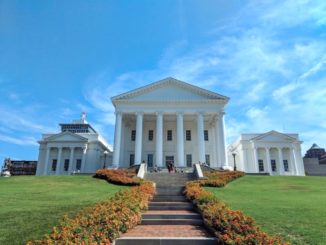
~ Press release issued by Virginia Farm Bureau Federation
RICHMOND — Already burdened by the unprecedented challenges brought on by the COVID-19 pandemic, Virginia’s farmers now face the prospect of losing access to vital funding for agricultural cost-share programs.
Gov. Ralph Northam introduced several amendments to Virginia’s biannual budget in April due to changing revenue forecasts amid the pandemic, and subsequently froze new state spending for fiscal year 2022.
In the amended budget, $18.6 million in funding for Virginia’s agricultural best management practices cost-share program was cut, leaving just $8.8 million in program funds for 2022.
With farmers required to comply with Phase III Watershed Implementation Plan mandates by 2025, Virginia Farm Bureau Federation is asking lawmakers to restore cost-share funds to help meet water-quality goals.
The Virginia General Assembly will convene Aug. 18 to adopt a new biennial budget.
“If farmers are going to meet nutrient reduction goals by 2025, we need to have a steady flow of dollars for our cost-share programs,” said Martha Moore, VFBF vice president of governmental relations. “We’re urging legislators that we need to maintain $35 million in base funding for cost-share programs for farmers to even hope to be on track for these goals.
“If we’re looking at an $8.8 million budget, it would be a huge setback.”
Chris Van Vlack, a hay and small grain producer in Loudoun County and president of Loudoun County Farm Bureau, concurred.
“In Loudoun County, we’ve put more cost-share money on the ground in the last couple of years than we ever have,” Van Vlack said. “Because farmers are accomplishing a lot towards Chesapeake Bay Total Maximum Daily Load goals, this would really slow down our progress unless the state restores some of the money.”
Van Vlack also noted that money tied to cost-share programs helps pay the salaries of Virginia Department of Conservation and Recreation employees who provide technical assistance.
A budgetary imbalance would likely cause a workforce reduction at soil and water conservation district offices, which could lead to less personal and technical support for farmers.
“I could see that being a real danger,” Van Vlack said. “You don’t want to get to the point where staffing becomes so thin that there’s nobody to help implement the programs.”
RELATED ARTICLES
Cattle prices abysmal as retail beef costs soar
Livestock farmers may benefit from proposed processing legislation
Proposed bill would help farmers apply for PPP loans
Grants available for local governments to support ag and forestry during COVID-19 crisis and beyond



Be the first to comment